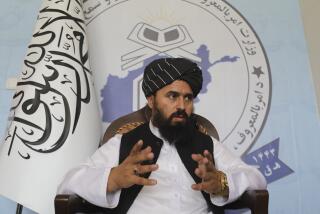The Afghan feature film ‘A Letter to the President’ depicts the fearlessness required of a woman who stands up to men and tradition
The men conspire as the woman awaits execution.
The fate of Soraya is the fierce center of “A Letter to the President,” a film from a female Afghan director that explores patriarchy and tribal justice in a nation battered by suicide bombers and generations of war. A married woman and a police chief, Soraya is an inspiration to feminists and a threat to the cruel designs of a male-dominated culture.
The feature film, which will be shown at this month’s Palm Springs International Film Festival, was directed by Roya Sadat with an unsettling power that explores a society that executes women for adultery and teaches girls they matter less than their brothers. Soraya’s rejection of this orthodoxy leads to a series of events, including the accidental killing of her abusive husband, that land her in a Kabul jail, where she pens her defense in a letter to the president.
“Silencing my voice,” she writes, “will always haunt your conscience.”
“A Letter” is a foray into a country the West views mainly through the prism of America’s longest war against the Taliban. It is a beguiling land of mountain passes, whirling snows and brilliant sunsets. At a time when the U.S. is confronting a stream of sexual harassment accusations, the movie is a pointed reminder of the systemic discrimination and brutality women daily endure in the world’s remote shadows, away from the hum of Twitter, the glare of television coverage and the protection of courts.
The catalyst for the film — Afghanistan’s Academy Award foreign language entry — was to “break the silence, to give a voice to the most suffered and marginalized people: women,” Sadat, who was a teenager under Taliban rule, said in email correspondence from Afghanistan. “The current stories of women in Afghanistan are stories of victims, … their bravery, honesty and emotions.”
The film’s cultural and traditional explorations are similar to “The Stoning of Soraya M.” (2008), based on the real-life execution of an Iranian woman accused of adultery, “Persepolis” (2007), a black and white animated tale of a girl witnessing the loss of women’s freedoms during the 1979 Iranian Revolution, and “Layla M.” (2016), which follows a European Muslim to the Middle East, where she grows disillusioned by the radicalized Islam that turns her husband into a suicide bomber.
You will have to burn in pain and put up with it.
— A mother tells a daughter to endure an abusive husband
In “A Letter,” Soraya (portrayed by Leena Alam) wears a veil, but her position as a police investigator unnerves tribal elders when she stops one of them from killing his young wife over accusations that the girl dishonored him. The men in Soraya’s life — husband, father-in-law, intelligence officer and a provincial commander — regard her intervention as a blasphemous affront to male dignity. She doesn’t relent, and in a scene that stunned Afghan audiences, as if the arrival of a longed-for cultural reckoning, Soraya slaps her husband after he first strikes her.
“It’s not just about a slap, but it is a slap on the face of injustice, discrimination and violence. That’s why people liked it,” said Sadat, whose husband, Aziz Deldar, wrote the screenplay. “Radicalism, illiteracy and poverty impact women’s rights. It’s still too early to claim that there is a major change in women’s rights despite [some] overall improvements. However, my society is changing rapidly to find its way.”
The movie opened in Kabul and was praised in many quarters, including by Farkhunda Zahra Naderi, a female advisor to President Ashraf Ghani, who was quoted in the local press as saying: “Even though we are in the middle of a war, at the same time we see brave faces and talented faces of Afghanistan who make us proud.”
The film has played at film festivals in Switzerland and South Korea. In a review, Variety called the film “rough-edged as cinema, but pointed and persuasive as social polemic.”
Sadat, who directs TV dramas and movies, has emerged as one of her nation’s most important artistic voices for women. One of her earlier films told the tale of a woman coerced into drug trafficking and, like “A Letter,” took on themes of gender and corruption in a fractious country of clans and warlords. Afghanistan is a crossroads for the opium trade and radical Islam, a land that harbored Osama bin Laden and daily battles the Taliban, which a U.S.-led invasion overthrew in 2001.
We had to use different routes and move in small groups to not put the entire team at risk.
— Roya Sadat on filming in dangerous Afghanistan
Afghanistan has no professional studio, so Sadat had to contend with gun battles, terrorist attacks and extremism during filming.
“I had to shoot in real locations, which were mainly in insecure areas,” she said. “In order to mitigate the risks, I had to cut the shooting period short to avoid the crew being identified and targeted. We had to use different routes and move in small groups to not put the entire team at risk.”
Such tension seeps into daily life and corrodes the soul in real life and in fiction. Soraya is a successful detective, but she sees in her husband a once loving man turned violent toward her as he is diminished by bribes, tribal pressures and the uncertainty that threatens his standing and income. Soraya too feels the burden, moving through scenes in shafts of clean and dusty light in what becomes a tortured grace.
She is whittled but not defeated, even when she appears at her mother’s house after being beaten by her husband and is told: “You will have to burn in pain and put up with it.”
The consequences are profound when she can’t. Soraya begins her letter, which grows into a book, in a cell awaiting execution. Men scheme against her. The president, a solemn leader facing existential threats from many sides, factors her into his equations in a tick-tock drama that leads Soraya to the gallows. Calls are made to save her. But will they reach the hangman in time? Her fate, Sadat’s film argues, is also her nation’s.
See the most-read stories this hour »
Twitter: @JeffreyLAT
ALSO
Fatih Akin’s new thriller ‘In the Fade’ looks at neo-Nazis and a disturbing world of terror and hate
Tweets, sexual abuse and racial divides shook the entertainment industry and beyond in 2017
More to Read
Only good movies
Get the Indie Focus newsletter, Mark Olsen's weekly guide to the world of cinema.
You may occasionally receive promotional content from the Los Angeles Times.







